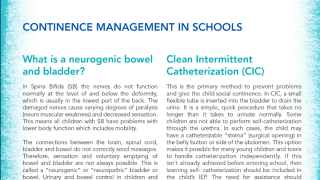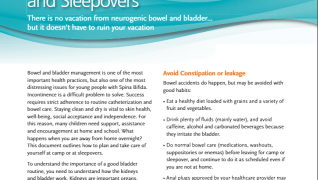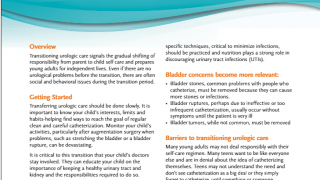Pediatric Urinary Tract Infections and Catheterization in Children with Neurogenic Bladder and Bowel
Why is it important to begin urologic care in infancy and continue throughout life?
There are two main reasons:
- To protect the kidneys from damage
By preventing urinary tract infections (UTI) - By identifying and treating vesicoureteral reflux
(VUR). Keep bladder pressures low - To help to promote bladder and bowel continence
How do I know my child has a UTI?
• Fever
• Excessive fussiness or sleepiness
• Change in odor or appearance of urine
(bloody, cloudy)
• Decreased appetite
• Vomiting
It is important to recognize symptoms of UTI in infants because they cannot complain when they become ill. Sometimes a fever may be the only obvious symptom. A high fever may mean there is a kidney infection, which is more serious than a bladder infection.
Children with SB can communicate their symptoms but may not be able to sense pain on urination or be able to identify (localize) where discomfort is coming from.
Therefore, complaints may be vague, and the child may generally not feel well. Some may be sleepier than usual or be less active. A continent child may have urinary accidents. Decreased appetite, nausea, and vomiting are also common.
How are UTI’s prevented?
Avoid urinary retention. Urinary retention occurs when urine sits in the bladder for long periods of time, and the bladder is not adequately emptied. To manage this problem, clean intermittent catheterization (CIC) is necessary to empty the bladder, usually several times each day. Because bladder infections can be problematic, a new catheter is recommended for each catheterization.
Bowel Management. Ensure soft stools every day to prevent constipation. Constipation causes excessive stool in the rectum which leads to increased bacteria on the perineum (area between the anus and urethra). Increased bacteria near the urethra can
cause infection.
Prophylactic (preventative) antibiotics are sometimes used in children who have had multiple infections effective in preventing but not treating, UTIs.
What is VUR?
Vesicoureteral reflux means that urine moves upward from the bladder back into the kidneys. Normally, the ureters (tubes that transport urine from kidneys to the bladder) work as a one-way valve, preventing urine from traveling from the bladder to the kidneys. In VUR, urine goes both ways. When there are bacteria in the urine, it can cause kidney infections, which in turn can damage the kidneys. Although bladder infections are a nuisance, kidney infections are dangerous, because the kidneys may be permanently damaged.
How do I know if my child has VUR?
VUR is diagnosed through a test called a voiding cystourethrogram or VCUG. Typically, a VCUG is performed at birth to screen for reflux. It may be repeated if the child has a UTI with fever, or if there the kidneys. Hydronephrosis is diagnosed with ultrasounds, which are also performed at birth and regularly after that.
How is a VCUG performed?
A catheter is placed into the bladder. A dye that can be seen on X-rays is instilled into the bladder through the catheter. X-ray images are obtained during filling and urination. A healthy bladder appears smooth. A neurogenic bladder often outpouchings called diverticula. Although neurogenic bladder and bowel cannot be cured, a lifetime of regular urologic care and careful management through catheterization and bowel management will protect kidneys and ensure a healthier life.
Although neurogenic bladder and bowel cannot be cured, a lifetime of regular urologic care and careful management through catheterization and bowel management will protect kidneys and ensure a healthier life. This information does not constitute medical advice for any individual. As specific cases may vary from the general information presented here, SBA advises readers to consult a qualified medical or another professional on an individual basis.
This information does not constitute medical advice for any individual. As specific cases may vary from the general information presented here, SBA advises readers to consult a qualified medical or other professionals on an individual basis.
Tags


